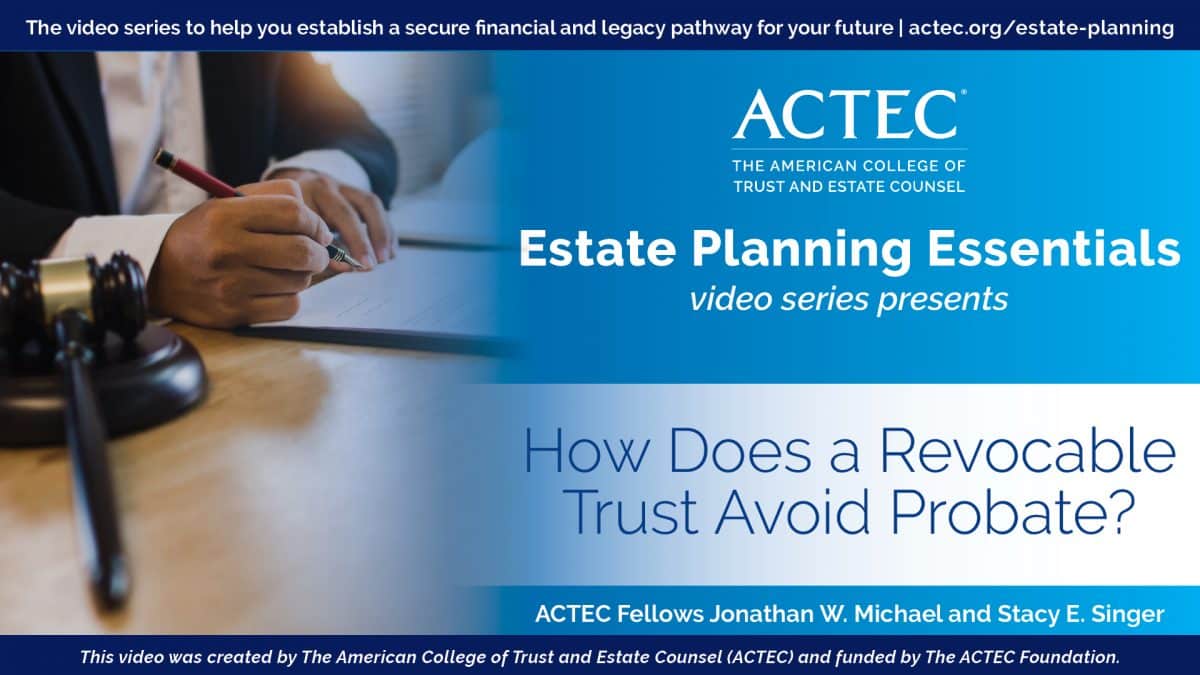Understanding probate is important because it involves the legal process of distributing a deceased person’s assets and settling their debts, which can have significant financial and emotional implications for the deceased’s heirs and beneficiaries. Individuals may encounter delays, expenses, and potential disputes in the estate settlement process without a clear understanding of probate.
ACTEC Fellows Richard R. Gans and Phillip A. Baumann discuss and explain the ins and outs of the process, such as the difference between probate and non-probate assets, in easy-to-understand terms.
Transcript
Good morning. My name is Rick Gans and I’m an ACETC Fellow. I’m here this morning with Phil Baumann from Tampa, Florida, also an ACTEC Fellow, and our topic today is what is probate.
What is Probate
So Phil, what is probate?
Phil Baumann: Well Rick, strictly speaking, probate is just the validation of the will of the decedent, the person who has recently died. But more recently, people have used that word to mean, or to refer to, the entire administration of a decedent’s estate.
Rick Gans: Well, you say “administration of a decedent’s estate.” What does that mean?
Phil Baumann: Well, Rick, that means that the court appoints somebody to gather the assets of the estate to determine what debts the decedent left behind, including what taxes are owed, and then takes those assets, pays the bills, and then distributes whatever is left to the beneficiaries who are entitled to these assets.
Rick Gans: You say that the court appoints somebody. What does that mean?
Phil Baumann: Well, if you named somebody in your will to administer your estate, that’s only the first step. The court has to determine that they’re eligible and then appoints that person to handle the estate and gives them a document that they can show to others to show that they have the authority to collect the assets of the decedent’s estate.
Rick Gans: Does the person who gets appointed have to go to court as a rule?
Phil Baumann: Almost never. We have to go to court if there’s a dispute among the beneficiaries or among other people interested in the estate, but most of the time, we submit the paperwork to the court and we just proceed.
Rick Gans: How long does it take to get started?
Phil Baumann: Oh, you know, it depends on what jurisdiction you’re in. Some cities, especially big cities, are busier than others and it takes a little longer, but maybe a week or two weeks at the most, usually. And in one case, I had a personal representative appointed the very same day that I filed the paperwork.
Rick Gans: Excellent! So does the personal representative have to pay the decedent’s creditors?
Phil Baumann: Yes, there’s a priority, and once the personal representative has collected the assets, the first thing to do is to determine what bills are to be paid, and they get paid first. The beneficiaries get paid after the bills and taxes are paid.
The Probate Process
Rick Gans: That sounds like it takes it takes a long time. How long does it normally take?
Phil Baumann: Usually, an estate can be administered in a matter of months. For example, in Florida, we have a deadline. We have to close in the estate within a year after we’ve opened it unless we can show to the court there’s good reason to keep it open longer.
Rick Gans: I hear a lot of talk that probate is really expensive, and the lawyers charge a whole lot of money. Is there any truth to that?
Phil Baumann: Well, Rick, it can be, but usually, it only is if there’s a dispute that arises among the beneficiaries or with the creditors or something like that. But in 99% of the cases, there are no disputes that arise, and so it’s not nearly as expensive as people worry about. Probably the most, the highest expense, is the cost of hiring a lawyer to give advice to the administrator of the estate on how to execute his or her duties. And just about anybody, whether it’s a probate administration or a non-probate administration, needs that advice, so they’re gonna have that expense anyway.
Rick Gans: You say, non-probate estate. How would that happen?
Phil Baumann: Well, if a person dies with assets that are not subject to probate, you still have to collect the assets, you still have to pay the bills and distribute the assets to the beneficiaries. So regardless of which system you use, the administration is about the same.
Rick Gans: Well, Phil, I go to the bookstore. I see a lot of books on the shelves about avoiding probate and how to avoid probate.
Phil Baumann: Well, assets that avoid probate are assets that have a beneficiary designation, or are joint assets that are payable on death to someone, or a pay-on-death account at a securities firm, or they could be assets in a trust that are payable to the beneficiaries. All of those are still distributed in pretty much the same way, but you don’t have what is called the probate process, which involves the court proceeding.
Rick Gans: So, a person could have assets that would be subject to probate and a person could have assets that were not subject to probate. Is that a common kind of thing to encounter?
Phil Baumann: Yes, in fact, I would say most estates have assets that are both what you would call probate assets and assets that are non-probate assets.
Rick Gans: Okay, well, Phil, thanks a lot for being here with me today. It was very helpful.
Phil Baumann: Thank you.
Featured Video
How Does a Revocable Trust Avoid Probate?
Learn how a revocable trust can help avoid probate and maintain privacy for assets properly planned and transferred into a trust during a grantor's lifetime.
ACTEC Estate Planning Essentials

ACTEC Fellows provide answers to frequently asked trust and estate planning questions in this video series.



